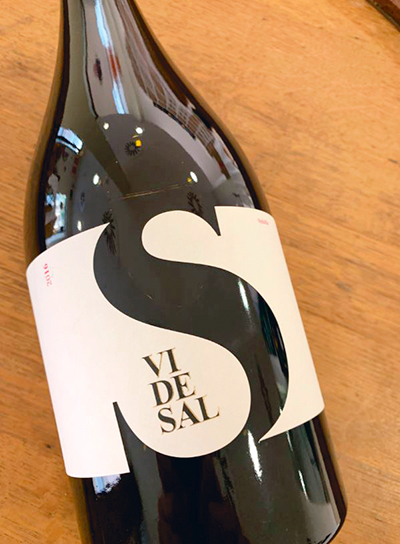FEEDING THE FIVE THOUSAND
Perhaps I was the only one wondering what magic would be afoot when the Show Chef brought out a solitary Magret de Pato and set it before the multitude packed into the ground floor of the DO Alicante offices recently? How was this possibly going to feed us all, or perhaps more to the point, how were we all going to pair the duck breast with the new wine we were there to celebrate?

The magnums of Vi De Sal 2016 adorned the room like the Crowns of so many Princes, left strategically for all to admire. Indeed, Vi De Sal is only bottled in magnums (that’s one and a half litres of wine in one bottle!) – clearly there was enough wine for the throng, but magret?
I’ve written a Cork Talk about Finca Collado before (archived here https://www.colinharknessonwine.com/delight-defined/#more-‘. I enjoyed their portfolio, so I was pleased to be invited to the launch of their brand new wine, Ví de Sal – a wine with a fascinating story, as I was about to find out.
I remember meeting Samuel Castello, son of the founder of Finca Collado, one hot morning over a coffee in Jalón. He gave me a couple of his wines to taste for the article above. We chatted about the bodega, its wines, philosophy – the project as a whole. It was all very interesting, the more so when he mentioned a special project, within a project (alluded to at the end of the above article). Their Head Winemaker was working on a new, very limited release wine which they were hoping to launch ‘soon’. The ‘soon’, wasn’t defined, despite my pressing, but it turns out it’s now – just 15 months after our chat!
As the gentle stream of people arriving at DO Alicante, not far from the Ayuntamiento, slowly turned into a river of journos, restaurateurs, hoteliers, wine merchants and the general glitterati of Alicante City, those of us who’d arrived early were able to advance on the wines served before the big event. These wines were also paired with exquisite gourmet tapas made by the Show Chef’s teams from Restaurante Miguel Angel, Villena.
We went straight for the Finca Collado Chardonnay/Moscatel 2018, a really refreshing white wine about which I’d waxed lyrical in my last article (though a different vintage, of course). Well, I’m happy to report that their high standard has been maintained. The Moscatel, picked earlier than is the norm in the Marina Alta area, lends a more floral character to the wine, that the grape/raison aromas that we are perhaps used to. The Chardonnay, which is about 60% of the blend and has had a little oak ageing, adds depth, plus a little tropical fruit too. It’s a lovely wine for drinking now, though Samuel suggests it will be even better in a few months time.
Finca Collado Syrah Monastrell 2017 is a wine for meaty food! A bold wine, with good fruit, some lively tannin and acidity and a combination of black pepper and olives with dark plums about to reach full ripeness.
Delit 2017, with its simple, effective label is a step up in quality. 100% Monastrell from old vines, fermented and aged in oak barrels of 300 litre capacity. Rich and rounded on the palate, it’s a full wine, but with finesse. Some mountain herbs along with Autumnal earthy notes and lovely damson fruit.
Ví De Sal, will only be made in exceptional years. This 2016 is the first, there won’t be a 2017, but there will be 2018! A magnum of this wine will cost you 70€, so it’s not cheap, but don’t forget that’s two bottle’s worth – and don’t forget also Christmas is coming! This wine will be so impressive for you and your Christmas Lunch/Dinner guests!
In the south of the Alicante region there are the mountains of the Sierra Salinas, here you’ll also find the Salinas lake. Finca Collado’s vineyards are situated here, about 500m above sea level. I mention sea level deliberately because, millions of years ago the whole area was under the sea! This has left a certain saltiness in the earth. Indeed, centuries ago there were salt mines here. And it’s this saline quality in the soils of the vineyards that contributes to a local phenomenon, which is responsible for the unique singularity of Ví De Sal.
Some years, according to rainfall and other climatic conditions the Monastrell vines in the vineyard specific to this wine reach the limit of their tolerance of the saline effect. They almost collapse, and in an effort to hold onto life their grapes are forced to dehydrate, in order to provide some desperately needed water for the plant. During this three day period the grapes are hastily harvested as the juice that is left is far more concentrated but they haven’t yet reached full maturation. The result of this is a rich must which retains a high acidity and expresses the terrior from which it came.
This translates into a minimal intervention wine that is high in alcohol (15%), rich on the palate but with alluring fresh acidity. The wine is fermented in large 600litre French oak barrels, with regular stirring to extract colour and flavour from the skins. It’s then aged in the same barrels for 12 months, adding depth and complexity, though the wine is so well made you can hardly detect the oak.
You’ll find rich plum/damson fruit, a reference to figs and liquorice with some dark chocolate on the finish. There’s thyme and eucalyptus on the nose and ig though it is, there is also an elegance to this wine.
colin@colinharknessonwine.com Twitter @colinonwine
Facebook Colin Harkness Youtube Colin Harkness On Winewww.colinharknessonwine.com
